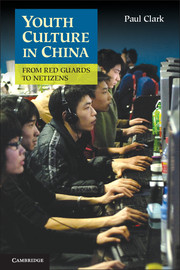Chapter 1 - Introduction
Finding Youth in China
Published online by Cambridge University Press: 05 June 2012
Summary
In the late 1960s, when American youth were longing for or enjoying summers of love, their Chinese counterparts were engaged in somewhat different activities. Some were still active as Red Guards, the shock troops who answered Chairman Mao’s call for continuing revolution and for the overthrow of his rivals in the leadership. Millions of young Chinese had started the journey to rural exile, to learn from the peasants and deepen their Maoist faith. Youth culture, epitomised by Woodstock and the wider Western youth rebellion of the 1960s, seemed to have passed China by, though Red Guards represented their own kind of revolt against established norms. Twenty years later, China was more open to outside connections and young Chinese knew about Michael Jackson, the Beatles, and much more. Distinctive youth cultures had emerged in a nation undergoing rapid change. Forty years after Woodstock, young China formed the largest mass of Internet users in the world. Despite government efforts at control, Chinese youth took to the opportunities the ’Net offered with the kind of gusto with which American youthful rebels had embraced rock ’n roll and rebellion a generation or two earlier.
This book seeks to trace the emergence and elaboration of youth cultures in China over this forty-year period. It will show that China’s youth, even in Mao’s time, were as active in their own ways at asserting their ambitions and difference as their Western counterparts. Three historical junctures in the formation of Chinese youth identity – 1968, 1988, and 2008 – provide key moments on which to map the rise of Chinese youths’ engagement with the world as China moved from the relative isolation of Maoist times to what appears to be invasive globalisation, symbolised by the Beijing Olympics. We will plot the emergence and elaboration of youth cultures from the time of the Red Guards in the 1960s through the 1980s to the current world of the Chinese Internet. The study will illustrate how the interplay between indigenous factors and foreign influences has continued, over more than forty years, to shape youth identities in the People’s Republic.
- Type
- Chapter
- Information
- Youth Culture in ChinaFrom Red Guards to Netizens, pp. 1 - 9Publisher: Cambridge University PressPrint publication year: 2012



